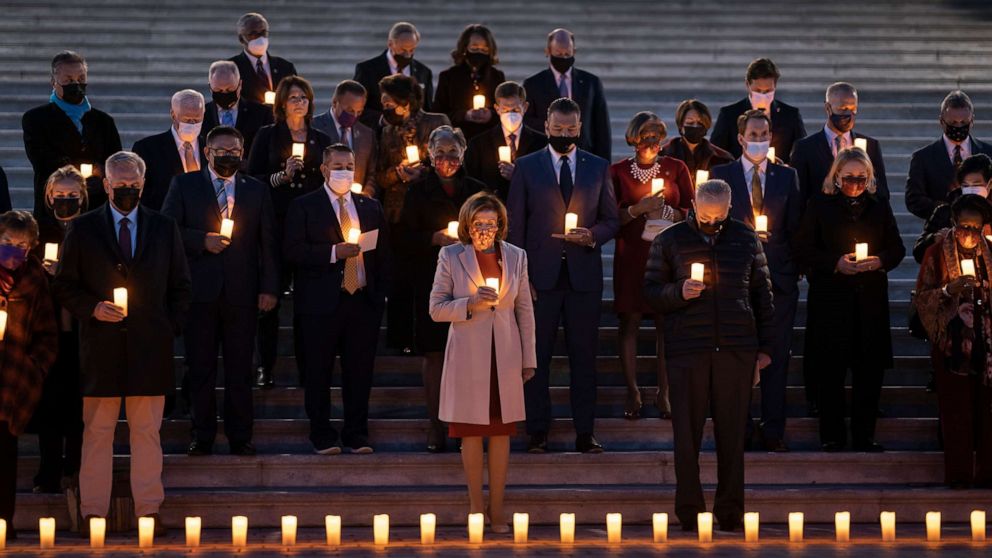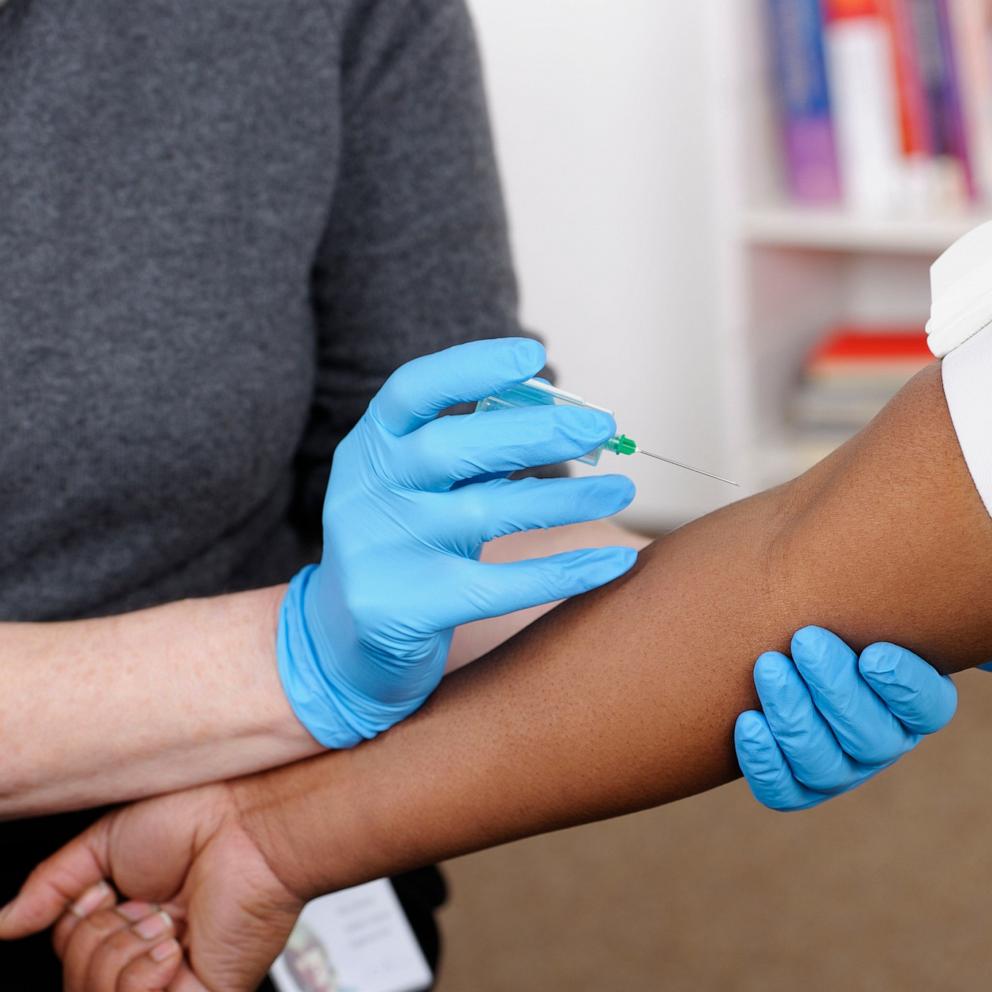'A defining tragedy': US COVID death toll eclipses 800,000 as winter surge intensifies
As Americans gather to toast the end of another particularly difficult year, many loved ones will be notably missing from holiday celebrations, a glaring reminder of the tragic realities of the coronavirus pandemic.
On Tuesday, the United States reached yet another staggering milestone, with 800,000 Americans now confirmed lost to the coronavirus, according to newly updated data from Johns Hopkins University.
"This will be a defining tragedy of our generation," David Dowdy, an infectious disease epidemiologist at Johns Hopkins Bloomberg School of Public Health, told ABC News. "We've gotten to the point where our eyes glaze over on these numbers. But by now, almost every one of us knows someone who has died of COVID-19."
The sobering marker comes less than two years into the pandemic, and despite the introduction of the first coronavirus vaccines, nearly one year ago.
"As we mark the tragic milestone of 800,000 American deaths due to COVID-19, we remember each person and the lives they lived, and we pray for the loved ones left behind. I know what it’s like to stare at an empty chair around the kitchen table, especially during the holiday season, and my heart aches for every family enduring this pain," President Joe Biden said in a statement Tuesday evening. "To heal, we must remember. We must also act. That’s exactly what we have done over the past 11 months."
He praised the vaccines and said that as of now, 200 million Americans are fully vaccinated, and many are getting boosted every day.
"I urge all Americans: do your patriotic duty to keep our country safe, to protect yourself and those around you, and to honor the memory of all those we have lost. Now is the time," Biden said.
Half a million lives lost since last December
When the first COVID-19 vaccines were administered last December, many Americans hoped the shots would herald a return to normalcy. However, since last December, an additional 500,000 Americans have died of the virus. Of those, just shy of half -- 230,000 -- lost their lives since April 2021, when President Biden announced the vaccine was now widely available to every American over the age of 18.
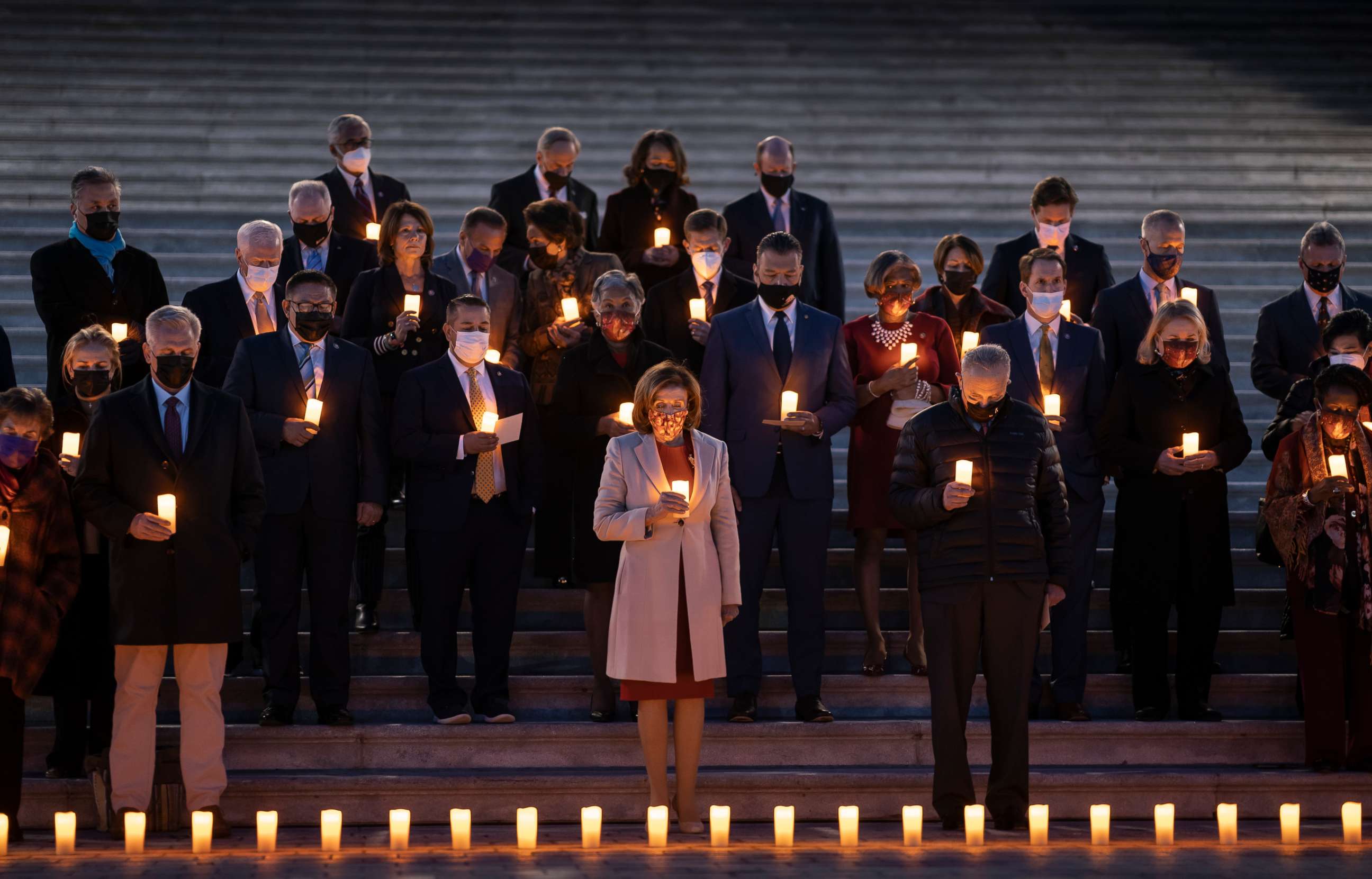
"The vast majority of these deaths could have been avoided," said Dr. John Brownstein, an epidemiologist at Boston Children's Hospital and an ABC News contributor. "Despite the availability of vaccines, we have seen close to half a million deaths since first shots went into arms last December."
Americans in every state, city and town have felt the personal impact and ripple effect of the virus.
An analysis tracking the extensive reach of COVID-19 loss of kin with a bereavement multiplier, published by the Proceedings of the National Academy of Sciences, estimated that 7.2 million family members may be grieving the loss of a loved one due to the virus.
The staggering number of deaths due to COVID-19 is now higher than the 700,000 Americans who have died from AIDS-related illnesses over the last four decades. It is higher than the total number of American troops who have died in battle since 1900, and about the same as the population of North Dakota. The U.S. has also recorded more deaths -- and cases -- than any other country in the world.
"Every other minute in this country, for almost two years now, that story has repeated itself. By the time you finish reading this [story], someone else will have died of this disease," Dowdy said.
Although the death rate is significantly lower than it was at the nation's peak last January, on average, more than 1,000 Americans are still being reported lost to the virus each day.
"[The average] is more than twice the rate of most countries in places like Europe, even though they have more cases than we do. This is an ongoing failure of our society," said Dowdy.
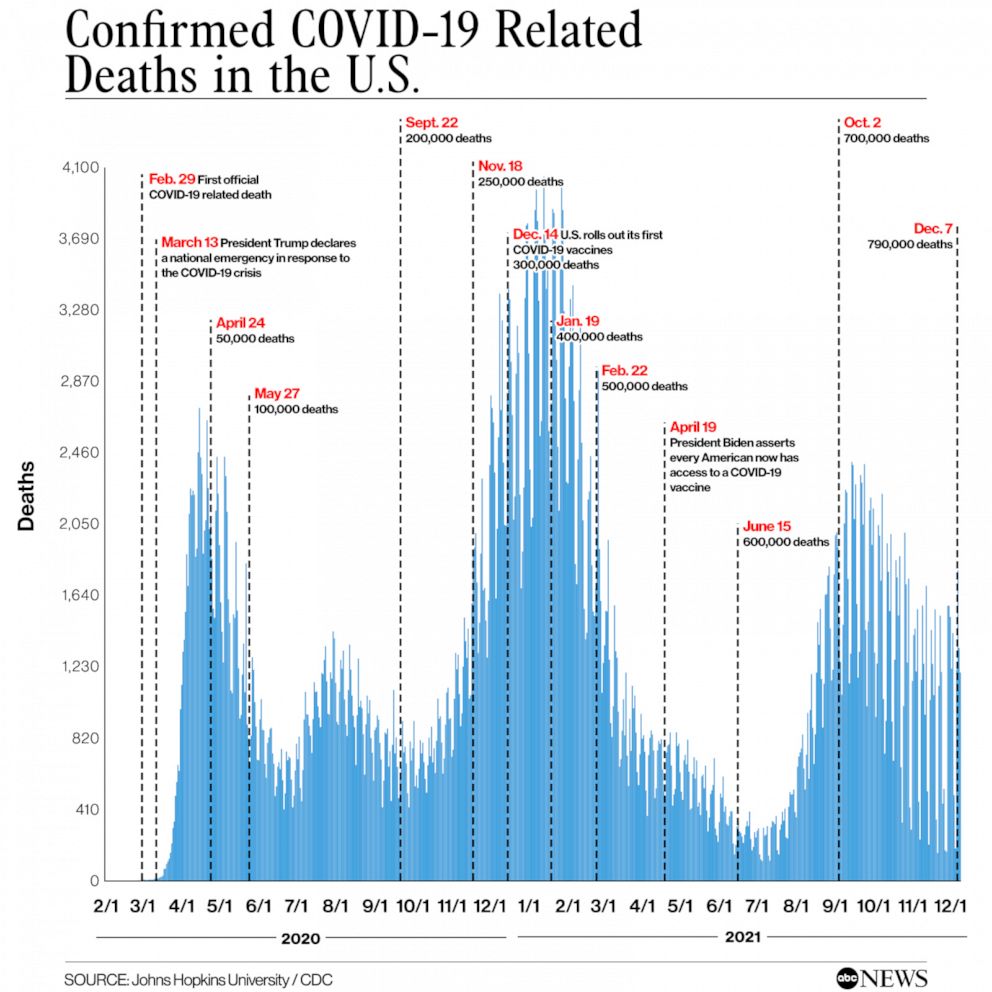
Some experts believe that the current COVID-19 death count could potentially be greatly undercounted, due to inconsistent reporting by states and localities, and the exclusion of excess deaths, a measure of how many lives have been lost beyond what would be expected if the pandemic had not occurred.
'This pandemic is clearly not over'
In the early days of the pandemic, even the highest death toll projections seemed unimaginable.
Studies have found that the virus was present in the U.S., potentially as early as December 2019, although widespread transmission likely did not occur until late February 2020, according to experts.
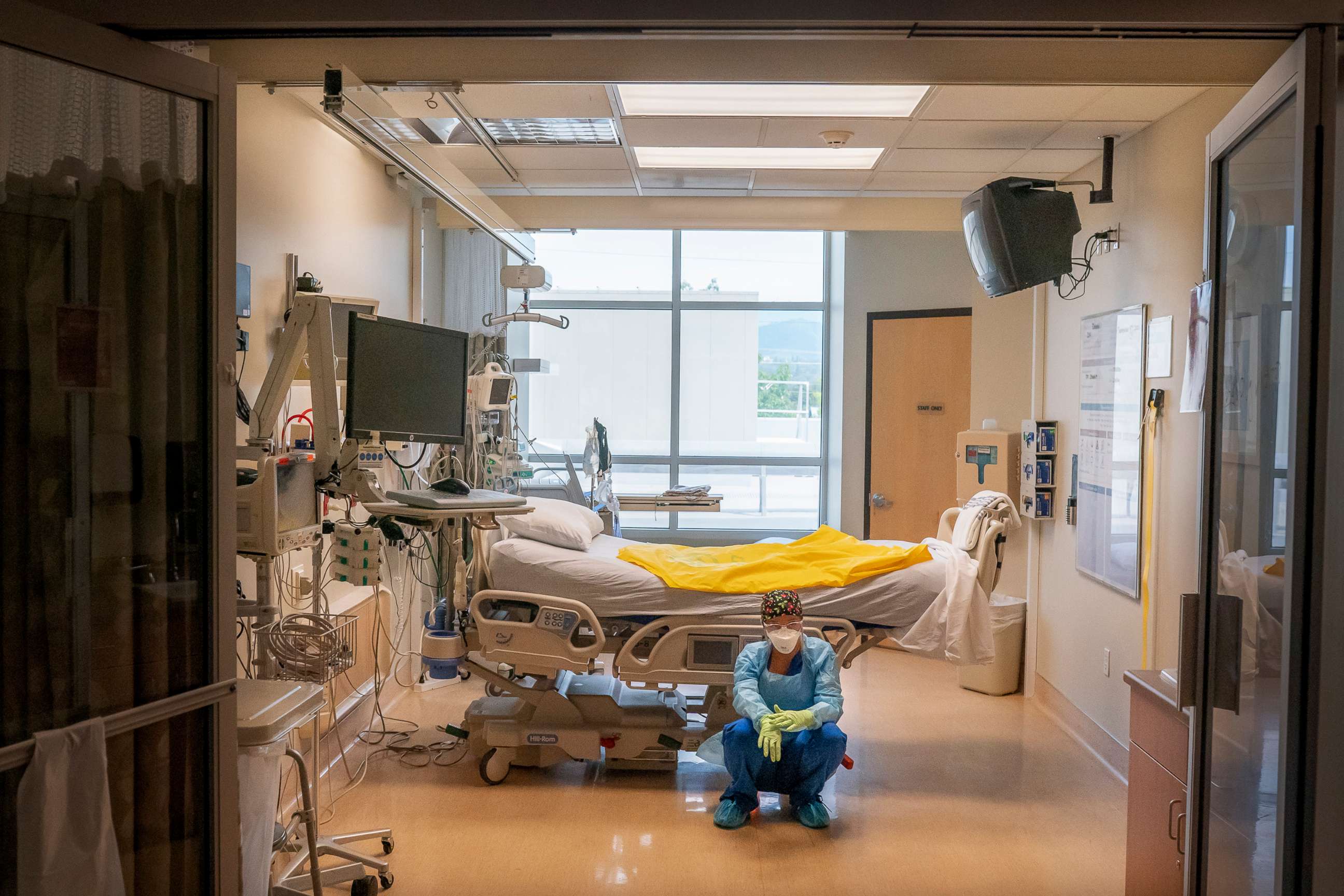
The COVID-19 death toll is now eight times what former President Donald Trump once stated, in the early days of the pandemic.
"The minimum number was 100,000 lives, and I think we'll be substantially under that number... So we'll see what it ends up being, but it looks like we're headed to a number substantially below 100,000," Trump said in April 2020.
Forecasts predict that as the U.S. faces yet another winter viral resurgence, and it is possible that thousands more lives could be lost before the end of 2021.
Experts say that a confluence of factors, such as vaccine hesitancy, cold weather, relaxed restrictions, the highly transmissible delta variant and the impact of waning vaccine immunity over time have all contributed to the higher death toll.
"This pandemic is clearly not over," UMass Memorial Health Care President and CEO Dr. Eric Dickson told ABC News. "This is really the toughest period of this whole pandemic right now for some of us."
Although 60% of Americans are currently fully vaccinated against COVID-19, according to the Centers for Disease Control and Prevention, 95 million Americans remain completely unvaccinated, and thus at risk for infection, severe illness and death.
Now, with new concerns over the omicron variant, health experts are urging Americans to get boosted as soon as possible. About 50 million people – 25% of fully vaccinated Americans -- have received an additional vaccine dose, according to the CDC.
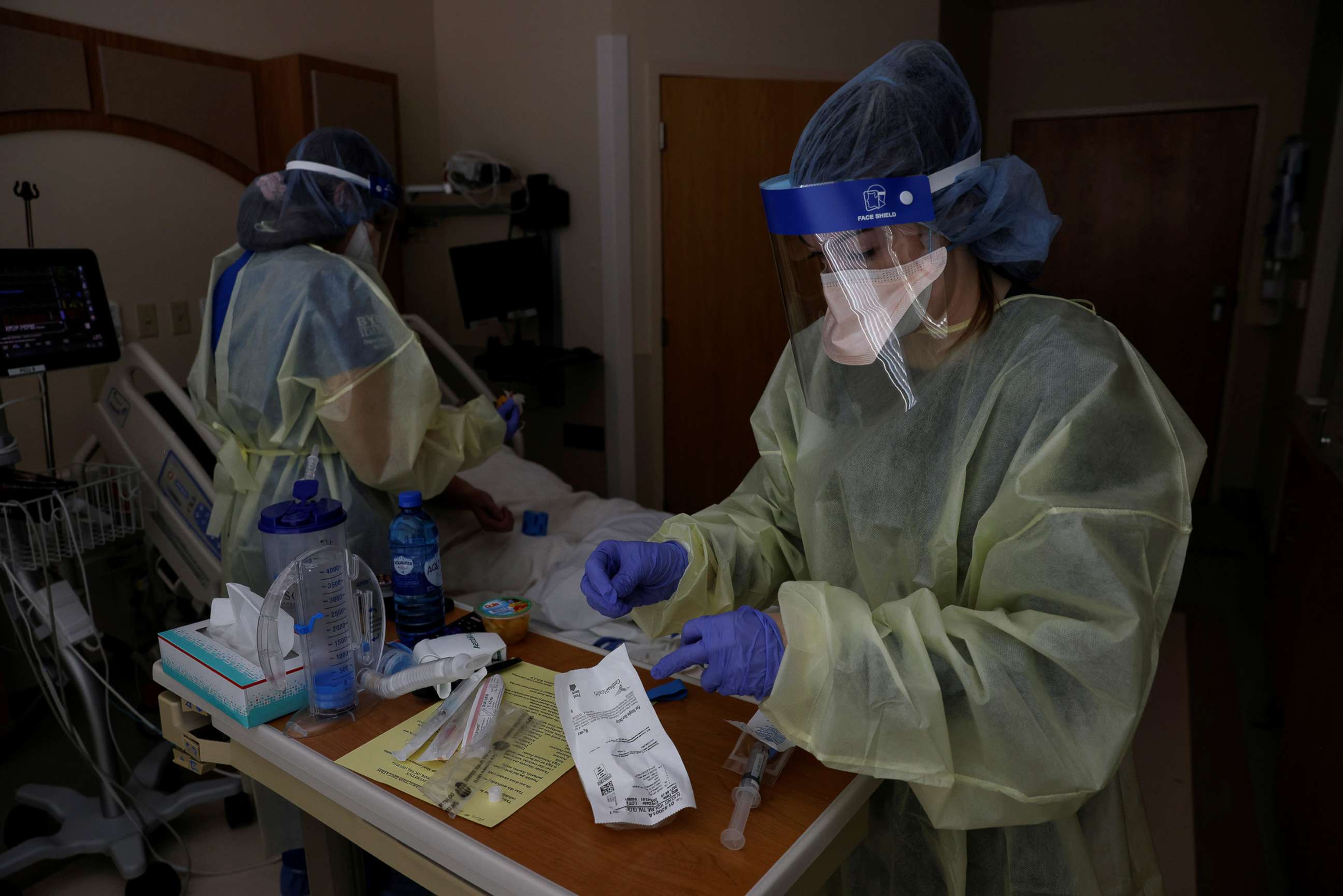
Unvaccinated individuals had a 5.8 times greater risk of testing positive for COVID-19 and a 14 times greater risk of dying from it, as compared to vaccinated individuals, according to federal data compiled in September 2021.
Although masking is required in all forms of public transportation across the country, COVID-19 restrictions have become sparse, with few jurisdictions now requiring face coverings or social distancing.
"Vaccine resistance coupled with a rapid return to normal life has been at the expense of a tragic loss of life," Brownstein said.
The rest of the upcoming winter holidays also continue to be a major source of concern for experts, after many communities saw an increase in cases and hospitalizations following Thanksgiving.
"While so many have done their part, we still have tens of millions of eligible people who have yet to recognize the tremendous loss of life that can be averted with the benefit that comes from getting vaccinated. This divide means that our devastating march to a million lives lost becomes even more certain," Brownstein said.
